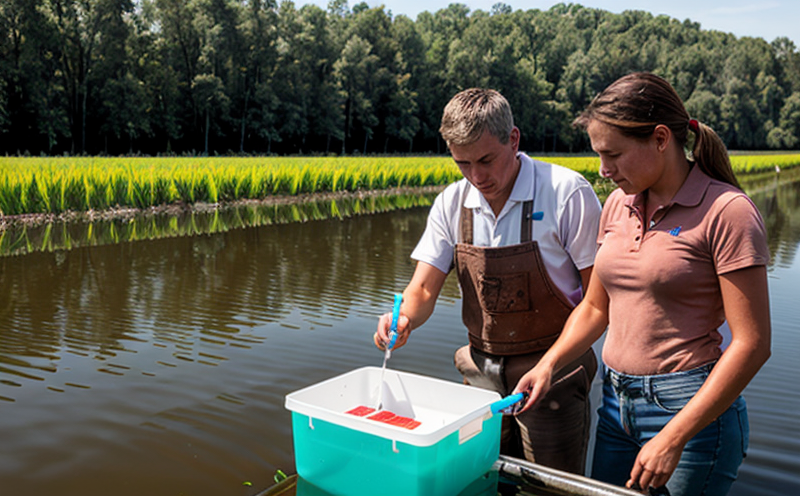Carbonate Hardness Testing in Irrigation Water
Water quality testing is a critical component of agricultural and forestry practices. In irrigation systems, water hardness directly impacts crop health, yield, and overall sustainability. Carbonate hardness (also known as temporary hardness) is one such parameter that plays a significant role in optimizing the performance of irrigation systems.
The primary cause of carbonate hardness is the presence of dissolved bicarbonates (bicarbonate salts like calcium bicarbonate). This form of hardness can be removed through boiling, which precipitates out the bicarbonate ions as carbon dioxide and calcium hydroxide. In contrast to permanent hardness (caused by calcium and magnesium ions), carbonate hardness does not leave behind insoluble residues.
For agricultural applications, understanding the carbonate hardness levels in irrigation water is essential for several reasons:
- To prevent clogging of irrigation systems due to precipitated salts
- To enhance crop health by maintaining optimal soil pH and nutrient availability
- To improve efficiency in water usage and reduce waste
- To comply with local and international standards that mandate water quality for agricultural use
Accurate testing of carbonate hardness is not just a matter of ensuring compliance but also of optimizing resource utilization. By testing the carbonate hardness, farmers can make informed decisions about the types of crops they plant, irrigation schedules, and the need for additional treatments to manage this parameter.
The testing process involves collecting water samples from different points in the irrigation system. These samples are then analyzed using standardized methods such as titration or potentiometric measurement. The results provide insights into the carbonate hardness levels, which can be used to adjust the irrigation schedule or recommend the use of softening agents if necessary.
Understanding and managing carbonate hardness is crucial for sustainable agricultural practices. In regions with hard water supplies, frequent testing becomes even more important as it allows for proactive management of water quality issues before they impact crops negatively.
| Region | Average Carbonate Hardness (mg/L) | Recommended Actions |
|---|---|---|
| Southern Europe | 100-250 mg/L | Consider softening agents or alternative water sources |
| North America | 300-400 mg/L | Monitor closely and consider treatment options if necessary |
| Australia | 250-350 mg/L | Regular testing is advised to avoid potential issues |
This table provides a general overview of carbonate hardness levels across different regions and the recommended actions based on these levels. The variability in carbonate hardness can significantly impact agricultural practices, making regular monitoring essential.
Why It Matters
The importance of carbonate hardness testing cannot be overstated, especially for quality managers and compliance officers. When water with high carbonate hardness is used in irrigation systems, it can lead to several issues:
- Clogging of Irrigation Systems: Excess bicarbonates can precipitate out as carbon dioxide and calcium hydroxide, leading to blockages.
- Reduced Crop Yield: Poor water quality can stunt plant growth and reduce overall yields.
- Erosion of Equipment: Hardness minerals can accelerate the wear and tear on irrigation equipment.
In addition, improper management of carbonate hardness can lead to violations of local and international standards. For instance, ISO 17025 outlines the requirements for proficiency in laboratory testing and calibration, ensuring that the results from such tests are accurate and reliable.
By conducting regular carbonate hardness testing, agricultural stakeholders can ensure compliance with these standards while also optimizing resource use. This proactive approach not only protects investments in irrigation systems but also promotes sustainable practices that benefit both the environment and long-term crop productivity.
Industry Applications
The application of carbonate hardness testing spans across various segments within agriculture and forestry:
- Irrigation Systems: Ensuring optimal water quality for efficient irrigation practices.
- Crop Health Management: Monitoring to prevent issues that can affect plant health.
- Sustainability Initiatives: Supporting efforts towards more sustainable farming and forestry practices.
- Resource Optimization: Helping in the strategic use of water resources, reducing waste, and increasing efficiency.
The testing process is integral to these applications. It helps in identifying potential issues early on, allowing for timely interventions that can prevent costly downtime and ensure continuous operation of irrigation systems.
In forestry, where large-scale operations are common, the importance of water quality cannot be overstated. Forest managers rely on accurate carbonate hardness data to maintain the health of their trees and the overall ecosystem. This testing is not just a one-time activity but an ongoing process that informs strategic planning for resource management and environmental conservation.
Use Cases and Application Examples
The following are specific use cases where carbonate hardness testing plays a crucial role:
- Preventing Equipment Damage: Regular testing can identify high carbonate levels before they cause clogging or damage to irrigation equipment.
- Optimizing Crop Health: Monitoring carbonate hardness ensures that the water used in irrigation is suitable for plant growth, leading to healthier crops and higher yields.
- Compliance with Standards: Ensuring compliance with local and international standards such as ISO 17025 helps avoid legal issues and enhances reputation.
- Sustainability Initiatives: By managing carbonate hardness effectively, agricultural stakeholders contribute to more sustainable practices that benefit the environment in the long term.
| Use Case | Description | Outcome |
|---|---|---|
| Precision Irrigation: | Using carbonate hardness data to tailor irrigation schedules for optimal water use. | Improved crop health and yield, reduced water waste. |
| Equipment Maintenance Planning: | Identifying times when equipment is most likely to be affected by high carbonate levels. | Precise maintenance planning, extended equipment lifespan. |
| Water Quality Reporting: | Providing accurate data on water hardness for regulatory compliance and internal reporting. | Informed decision-making, enhanced reputation. |
The above examples illustrate how carbonate hardness testing is integral to various agricultural practices. The use of this information in precision irrigation or equipment maintenance planning can lead to significant benefits such as improved crop health, reduced water waste, and extended equipment lifespan.





